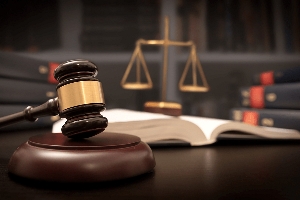Have you ever heard that it is better for ninety-nine criminals to be on the streets than one innocent person in jail. Wait a minute, ninety-nine criminals? That is unconscionable! They must all rot in jail! After all, it is just one innocent person.
What about a person is innocent until proven guilty, for some fanciful reasons, lawyers add something like “by a court of competent jurisdiction”.
However, you are certain that your boyfriend is cheating at the slightest suspicion. Yes, you’re the court of competent jurisdiction in that relationship. Well, in one or two occasion, you give him or her the “benefit of the doubt”.
Yes, that is the presumption of innocence until you catch him pants down. Most often, we are convinced that people are guilty even before we give them a fair hearing. Yes, you believe all men are cheats and all women are after your money. Don’t you?
All the above elements influence how our criminal jurisprudence treat accused persons relative to the doctrine of presumptive innocence, the right to bail and the conditions accused persons must meet to be admitted to bail. Guess what, the judge may think just like you.
b. Presumption of innocence
Fair trial is fundamental to the criminal justice system in a democracy where rule of law is observed. One of the fundamental pillars of Fair trial is the principle of presumption of innocence until proven guilty by a court of competent jurisdiction. This is because the right to personal liberty is one that is much desired by all human civilization and must be safeguard.
An arrest by the state effectively curtails an accused person’s right to personal liberty and freedom and juxtaposing the power of the state against an individual, the individual must be protected by law from the state.
It is for this reason article 19(2) (c) of the Constitution 1992 provides for the presumption of innocence of an accused person until they are proven guilty or they plead guilty to an offence.
Again, it is settled in law that a person who accuses another person of committing a crime must prove it. Therefore, it is sound in law to presume that an accused person is innocent until there is evidence sufficiently beyond reasonable doubt which establishes their guilt. For this purpose, a person standing trial ought not to be punished by being confined to prison cells while their guilt has not been established. That will be prejudicial!
c. Bail Conditions
To achieve the balance between protection of the rights of an accused person pending trial and the state’s obligation to do justice, accused persons are usually admitted to bail.
Bail is simply the legal obligation that an accused person will avail themselves during trial and a breach of which will trigger a restriction imposed by the court called the bail condition.
Under the laws of Ghana, section 96 of the Criminal and Other Offences (Procedure) Act, 1960 establishes the general laws on Bail.
It is instructive to note that, among other things the law proscribes the use bail as an instrument of punishing an accused person. The act states that, bail shall not be withheld or withdrawn merely as punishment.
The law recognises the vast discretionary powers allocated to a court in granting or refusing bail and attempts to provide inbuilt mechanisms to restrain the exercise of that discretion. Whether or not this mechanism serves its object is a matter to be discussed.
Again, the Chief Justice through the Judicial Service issues practice direction on how bail should be administered in order to curtail the unbridled application of discretion by judges in granting or refusing bail.
Hitherto, not all offences are bailable. For instance, a person who is alleged to have commit treason, murder, robbery among others could not be admitted to bail.
However, in the celebrated case of Martin Kpebu v. Attorney General, the supreme court held that, all offences are bailable. Let me hasten to add that, bail is subject to conditions that the accused person must meet.
While the section 96 of Act 30 attempts to outline some conditions that must be considered by a court before granting or denying a bail applications, the law recognises the discretionary powers of the court and further stated that, bail conditions must not be excessive or harsh so as to impede the accused person’s ability to meet them.
d. Challenges meeting bail condition
The difficulty however, is the actual and apparent abuse of the discretionary powers the court exercise in the determination of bail conditions. The ability of a person to meet the bail conditions is as important as the orders of the court to admitted an accused person to bail.
A person who is granted bail by the court but unable to meet the conditions would remain in police custody until such a time they are able to meet the bail conditions.
Essentially, the court’s order to temporarily grant an accused person their freedom of movement and personal liberty cannot be given any legal effect in the absence of meeting the required benchmark (conditions).
It will be immediately observed that the benchmark could be weaponized against accused persons who do not find favour before the bench.
Therefore, based on personal dislike or resentment or public prejudice, a judge may set the benchmark to bail so high that an accused person will effectively remain in police custody until their trial comes to an end.
Again, another legitimate issue to address arises where an accused person is admitted to bail and yet comes from a very poor family where it is practically impossible to meet the bail conditions even when they are without prejudice.
Because it is essential that the courts satisfy itself that an accused person admitted to bail will avail themselves for trial, the law imposes some conditions that must be met.
However, no matter how low the benchmark, some accused persons are unable to have the needed support from family or friends to meet such conditions. What then happens to those people? The position of the law is that they remain in custody until such a time where they are capable of meeting the benchmark.
For instance, the law requires that sureties (those who stand in for the accused person) in a bail application must be independent and of sufficient means.
How sufficient must they be? That is the benchmark left to the bench at discretion. Therefore, an accused person could be admitted to bail in considering all other circumstances surrounding the case and the judge’s mood or feelings in that material moment.
Unfortunately, these challenges lead to the abuse of the rights of an accused person and more so the very vulnerable persons who for one reason or the other find themselves under arrest.
But if a person is truly presumed innocent until proven guilty, why do we create through the backdoor impediments to the enjoyment of their rights? On a balance of convenience, to what extent should the interest of the state supersede the presumption of innocence?
Do we believe in principle that it is better for ninety-criminals to be on the streets than one innocent person to be jailed? Maybe, our criminal jurisprudence enjoys the mental illusion of upholding human rights when in practice we treat accused persons with contempt based on our prejudices. This and many more questions must be answered to clear the grey areas in our criminal jurisprudence in Ghana.
g. Conclusion
The foundations of criminal law are rooted in human rights and the respect for self-autonomy. As humans, we want to exercise our free will and self-determine our existence. We decided when to eat, sleep, walk, stand and these activities have been become so normal that we forget we can lose them within the moment we are arrested.
You are not too remote from the criminal justice system of Ghana, therefore, as citizens we must actively participate in discourses that advance a free, fair and just society for all.
We must speak against every form of injustice and hold public officers accountable for the powers they exercise on our behalf.
To conclude, the state must balance the protection of human rights of accused persons against their legal duty to protect the citizenry from crime.
Opinions of Saturday, 12 October 2024
Columnist: Jerry E. Reagan



















